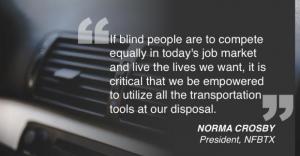
Two ridesharing companies who rolled into Austin as Uber and Lyft moved out earlier this year, Fare and Get Me, refused to make their mobile phone apps accessible to riders who use text-to-speech software, so today the National Federation of the Blind of Texas filed lawsuits in federal court.
Read the lawsuit against Fare and the lawsuit against Get Me.
Attorney Timothy Elder of the TRE Legal Practice, who is working with Disability Rights Texas (DRTx), explained how the group of five, blind Texans got to this point in a recent blog post:
“Members of the National Federation of the blind of Texas reached out to two of these services, Get Me and Fare, in hopes of helping these companies fix their apps and open up a market share that heavily depends on these sort of transportation services. Sadly, these companies were not responsive to making accessibility a priority for their eager blind customers.”
However, another company, Fasten, has included accessibility features for blind customers into its mobile app development process. Fasten is ensuring that its technology is accessible to blind customers and will remain accessible in future updates.
“As a blind person, I rely heavily on ridesharing services such as Get Me and Fare to take me where I need to go,” said Jeanine Lineback, one of the plaintiffs and President of the NFBTX Austin Chapter. “City transportation options are limited geographically, and regular taxi services are expensive. I have the right to enjoy the reliability, affordability, and convenience of these new ridesharing services just like everyone else.”
The real problem with inaccessible technology starts with transportation, but the difficulties touch every facet of life.
“If blind people are to compete equally in today’s job market and live the lives we want, it is critical that we be empowered to utilize all the transportation tools at our disposal,” said Norma Crosby, President of the National Federation of the Blind of Texas. “Ridesharing apps are a powerful tool of equality when nonvisual access is considered during development. A lack of such access can be detrimental to opportunities for blind users when developers fail to put in the simple
The individual plaintiffs include a student, an attorney, a professional consultant, a retired employee from the Texas Attorney General’s Office, and another retired professional. If you are blind or have low vision, we urge you to contact Mr. Elder to discuss your experiences with these (and other) ridesharing companies in Austin.
